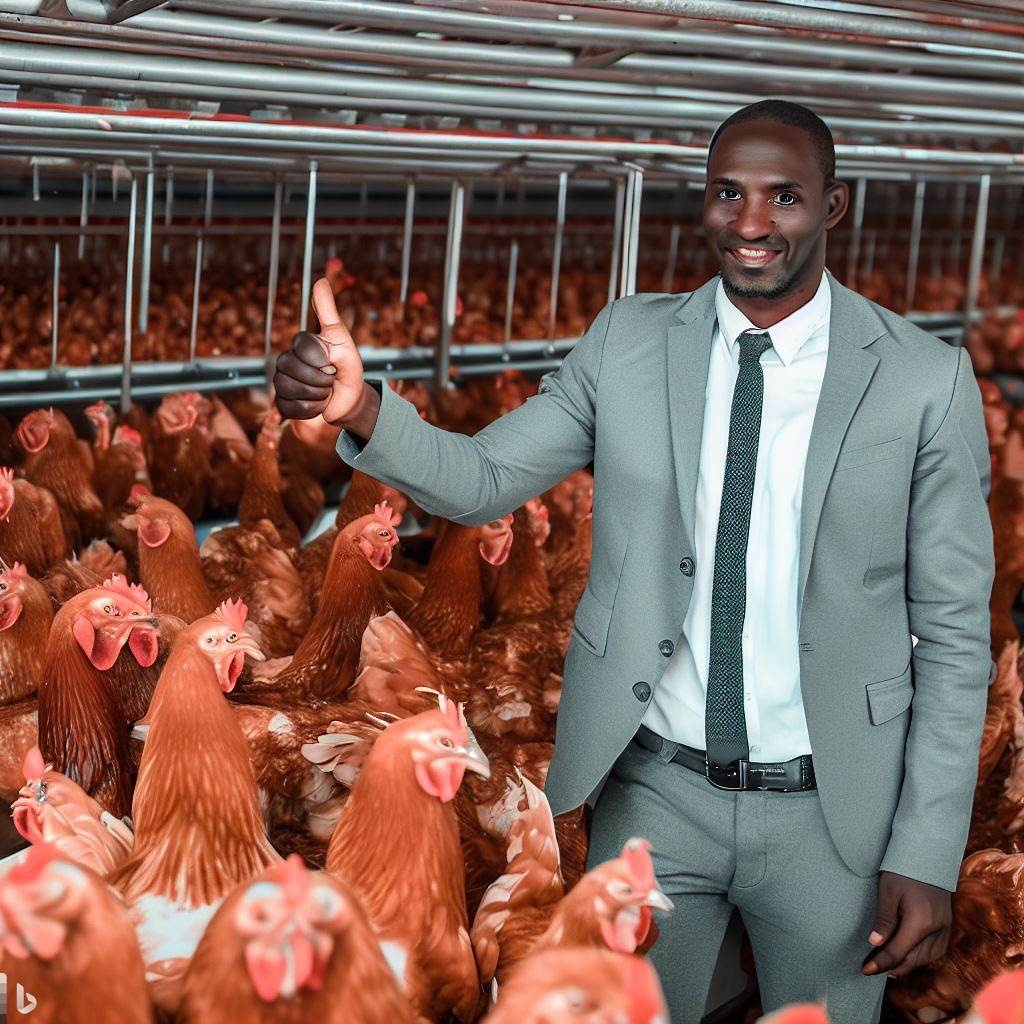Introduction
Poultry production in Nigeria has experienced significant growth and plays a crucial role in the country’s economy.
Successful poultry producers contribute to food security, job creation, and income generation.
Brief overview of poultry production in Nigeria
Poultry production in Nigeria involves the rearing of domestic birds such as chickens, turkeys, and ducks for meat and egg production.
The industry has seen remarkable progress, becoming a major sector in agriculture.
Importance of successful poultry producers in the country
Successful poultry producers are essential for Nigeria’s agricultural development and overall economic growth.
They provide a significant source of protein through meat and egg production, meeting the increasing demand for food in the country.
These producers also contribute to employment opportunities, especially in rural areas, where they create jobs along the poultry value chain, including farming, processing, distribution, and marketing.
Additionally, successful poultry producers generate income for individuals and households, supporting livelihoods and reducing poverty levels.
This income can be reinvested in other sectors, contributing to the overall economic wellbeing of the country.
Furthermore, the success of poultry producers stimulates innovation and technology adoption in the industry, leading to increased productivity, efficiency, and competitiveness.
This, in turn, attracts investment and boosts the agricultural sector’s contribution to the GDP.
Most importantly, successful poultry producers in Nigeria are crucial for food security, job creation, income generation, and economic development.
Their achievements positively impact various aspects of the country’s agriculture sector, making them key players in the nation’s journey towards sustainable growth.
Background of successful poultry producers in Nigeria
- Nigeria’s poultry industry has experienced significant growth in recent years.
- The demand for poultry products, including chicken meat and eggs, has been steadily increasing.
- Successful poultry producers in Nigeria play a crucial role in meeting the country’s poultry demand.
- These producers have established themselves as key players in the industry, implementing innovative approaches.
- They have achieved remarkable success by embracing modern technologies and best practices.
Overview of the poultry industry in Nigeria
- Nigeria’s poultry industry is the largest in Africa, with abundant opportunities for growth.
- The industry consists of both large-scale commercial producers and small-scale backyard farmers.
- Poultry farming contributes significantly to the country’s agricultural sector and economy.
- The demand for poultry products is driven by population growth, urbanization, and changing dietary habits.
- Despite challenges such as disease outbreaks and high production costs, the industry continues to thrive.
Prominent poultry producers in Nigeria
- Zartech Limited: Zartech is a leading poultry producer with an impressive track record.
- Amo Group of Companies: Amo Group has made significant contributions to Nigeria’s poultry industry.
- Animal Care Services Konsult: Animal Care Services is a renowned name in the poultry sector.
- Obasanjo Farms: Owned by former President Olusegun Obasanjo, the farm is a major poultry player.
- Chi Farms Limited: Chi Farms is known for its high-quality poultry products and advanced farming techniques.
Achievements and contributions of successful poultry producers in Nigeria
- These producers have revolutionized the poultry sector by adopting efficient production methods.
- They have invested in state-of-the-art facilities, including hatcheries, feed mills, and processing plants.
- Successful poultry producers have created employment opportunities, contributing to job creation in Nigeria.
- They have improved the quality and safety of poultry products through stringent quality control measures.
- These producers have also contributed to the country’s food security by ensuring a consistent supply of poultry products.
- Through their success, they have inspired and motivated other farmers to join the poultry industry.
- They have actively promoted sustainable farming practices, including waste management and biosecurity.
- Successful poultry producers have fostered technology transfer and knowledge sharing within the industry.
- They have played a vital role in the development of Nigeria’s poultry value chain and market expansion.
- These producers have contributed to the overall growth and development of Nigeria’s agricultural sector.
In short, successful poultry producers in Nigeria have made significant contributions to the industry’s growth and development.
They have achieved remarkable success by embracing modern technologies, implementing best practices, and ensuring the supply of high-quality poultry products.
Their achievements and contributions extend beyond economic factors, impacting job creation, food security, and sustainable agriculture in the country.
Factors contributing to their success
In this blog section, we will explore the factors contributing to the success of poultry producers in Nigeria.
Access to Capital and Investments
Poultry producers in Nigeria have been successful due to their access to capital and investments.
This financial support enables them to purchase necessary equipment, infrastructure, and feed, allowing for the growth and expansion of their operations.
Quality of Poultry Breeds and Genetics
Another key factor in the success of Nigerian poultry producers is the quality of their poultry breeds and genetics.
These producers focus on selecting breeds that are resistant to diseases, adapt well to local conditions, and have high productivity, resulting in healthier and higher-yielding flocks.
Adoption of Modern Farming Techniques and Technology
The adoption of modern farming techniques and technology has also played a significant role in the success of Nigerian poultry producers.
They invest in advanced equipment, such as automated feeding systems and climate control technology, to optimize productivity and minimize losses.
Additionally, they implement biosecurity measures to prevent the spread of diseases and improve overall flock health.
Effective Business Management and Marketing Strategies
Poultry producers in Nigeria achieve success by implementing effective business management and marketing strategies.
They establish strong relationships with suppliers and customers, negotiate competitive prices for inputs and products, and ensure efficient operations and supply chains.
Furthermore, they invest in branding and packaging to differentiate their products in the market and attract a wider customer base.
In fact, the success of poultry producers in Nigeria is attributed to various factors.
These include access to capital and investments, the quality of poultry breeds and genetics, the adoption of modern farming techniques and technology, and effective business management and marketing strategies.
By leveraging these factors, Nigerian poultry producers have been able to establish profitable and sustainable operations in an increasingly competitive industry.
Challenges faced by successful poultry producers
Outbreaks of diseases and infections
Poultry producers in Nigeria often face the challenge of disease outbreaks and infections in their flocks.
These can have devastating effects on the overall production and profitability of the business.
High cost of production inputs
Another major challenge for poultry producers is the high cost of production inputs such as feed, vaccines, medications, and equipment.
These expenses can significantly impact the profitability of the business and make it difficult to remain competitive in the market.
Inadequate infrastructure and logistics
The lack of adequate infrastructure and logistics is a significant challenge for poultry producers in Nigeria.
This includes issues such as unreliable electricity supply, poor road networks, and inadequate storage and processing facilities.
These limitations can hinder the efficient and timely production, distribution, and marketing of poultry products.
Lack of skilled labor
Poultry production requires skilled labor for tasks such as breeding, feeding, disease management, and general farm maintenance.
However, there is a shortage of trained and experienced personnel in this field in Nigeria.
This shortage can lead to lower productivity, increased costs, and reduced profitability for successful poultry producers.
Addressing these challenges is crucial to the success of poultry producers in Nigeria. Here are some strategies that can help overcome these obstacles:
Disease prevention and management
Proactive measures, such as implementing strict biosecurity protocols, regular vaccination programs, and proper hygiene practices, can significantly reduce the risk of disease outbreaks and infections.
Regular monitoring and disease surveillance are also essential for early detection and prompt intervention.
Efficient cost management
Poultry producers can explore cost-saving options such as bulk purchasing of inputs, optimizing feed formulations, and seeking alternative suppliers for production materials.
Additionally, implementing efficient production and management practices can help minimize wastage and maximize resource utilization.
Collaboration and infrastructure improvement
Poultry producers can collaborate with other stakeholders, such as government agencies, industry associations, and financial institutions, to improve infrastructure and logistics.
This can involve advocating for better road networks, access to reliable electricity, and the establishment of modern processing and storage facilities.
Training and knowledge transfer
Investing in training programs and knowledge transfer initiatives can help address the shortage of skilled labor in the poultry industry.
This can include providing practical training for farmers, organizing workshops and seminars, and promoting vocational training in poultry-related disciplines.
In the end, successful poultry producers in Nigeria face several challenges, including disease outbreaks, high production costs, inadequate infrastructure, and a lack of skilled labor.
However, implementing strategies such as disease prevention, efficient cost management, infrastructure improvement, and training can help overcome these obstacles and ensure sustainable success in the poultry industry.
Read: Overcoming Common Diseases in Nigerian Poultry Farms

Case Study: Olusegun Obasanjo
Background and History of the Producer
Olusegun Obasanjo, the former president of Nigeria, has a long history in poultry farming.
He started his poultry farm in the 1970s, and it has since grown to become one of the largest poultry farms in Nigeria.
The farm is located in Abeokuta, Ogun State, and it produces day-old chicks, hatching eggs, and poultry feed.
Obasanjo’s poultry farm has been a major source of income for him and his family.
It has also been a source of employment for many people in the area. The farm has also helped to boost the poultry industry in Nigeria.
Obasanjo has been a strong advocate for poultry farming in Nigeria. He has spoken out about the importance of poultry farming for the country’s economy and food security.
He has also provided financial assistance to poultry farmers in Nigeria.
In 2006, Obasanjo established the Olusegun Obasanjo Presidential Library (OOPL) in Abeokuta. The OOPL has a poultry farm that is used to showcase modern poultry farming practices.
The farm also serves as a training center for poultry farmers.
Success Story and Achievements
It has grown from a small farm in the 1970s to one of the largest poultry farms in Nigeria.
The farm has been a major source of income for Obasanjo and his family, and it has created jobs for many people in the area.
The farm has also helped to boost the poultry industry in Nigeria.
Strategies Employed for Success
Olusegun Obasanjo’s success can be attributed to several strategic initiatives.
Firstly, the company invested heavily in advanced farming equipment and infrastructure, enabling efficient production processes. This has led to increased output and reduced costs.
Furthermore, Olusegun Obasanjo prioritizes the well-being of its birds by implementing strict biosecurity measures and ensuring their proper nutrition.
This attention to detail has resulted in healthy and disease-free poultry, contributing to the company’s success.
Additionally, the company has developed successful partnerships with local suppliers and retailers.
By establishing strong relationships within the poultry supply chain, Poultry Olusegun Obasanjo has secured a reliable market for its products.
Impact on the Local Community and Industry
The success of Olusegun Obasanjo has had a profound impact on the local community and the broader Nigerian poultry industry.
Firstly, the company has provided numerous employment opportunities, directly benefiting the local workforce.
Moreover, Olusegun Obasanjo actively supports local farmers by providing training programs and technical assistance.
This has helped strengthen the local poultry industry as a whole, promoting sustainable growth and economic development.
Furthermore, the success of Olusegun Obasanjo has inspired other entrepreneurs to venture into poultry farming.
By showcasing the potential for success in this sector, the company has played a pivotal role in diversifying the Nigerian economy.
To summarize, Olusegun Obasanjo’s background, success story, strategic initiatives, and impact on the community and industry make it a true role model in the Nigerian poultry sector.
Through its commitment to excellence and innovation, the company has achieved remarkable growth and positively influenced the lives of many.
Read: The Power of Poultry: Boosting Nigeria’s Food Security
Discover More: Key Agricultural Professions: Boosting Nigeria’s Economy
Case Study: Usman Dantata Jr.
Background and History of the Producer
Usman Dantata Jr. is the son of the late Alhaji Aliko Dantata, a Nigerian billionaire.
He is the CEO of Anadariya Farms, a large poultry farm in Kano State. The farm produces day-old chicks, hatching eggs, and poultry feed.
Usman Dantata Jr. was born in Kano State, Nigeria in 1986. He attended the American University in Dubai, where he earned a Bachelor of Arts degree in Finance in 2010.
He then went on to earn a Master of Business Administration degree from Hult International Business School in 2015.
After graduating from business school, Usman Dantata Jr. joined the family business, Dantata & Sawoe, a construction company.
He worked in the company for several years before starting his own poultry farm, Anadariya Farms, in 2018.
Anadariya Farms is a modern poultry farm that uses the latest technology. The farm has a capacity of 500,000 chickens and produces over 10 million eggs per year.
Publish Your Professional Profile, Business or Brand
Showcase your expertise, gain trust, and boost visibility instantly on Professions.ng.
Publish NowThe farm also produces poultry feed, which is sold to other poultry farmers in Nigeria.
Usman Dantata Jr. is a young and ambitious entrepreneur. He is passionate about agriculture and believes that poultry farming can play a major role in Nigeria’s economic development.
He is committed to making Anadariya Farms a successful business and a major player in the Nigerian poultry industry.
In addition to his work in poultry farming, Usman Dantata Jr. is also involved in other businesses, including real estate and hospitality.
He is also a philanthropist and supports a number of charitable organizations in Nigeria.
Usman Dantata Jr. is a rising star in the Nigerian business community. He is a young, dynamic entrepreneur who is making a difference in the country.
He is a role model for young people in Nigeria and an inspiration to all who know him.
Success Story and Achievements
- Usman Dantata Jr. has become one of the leading poultry producers in Nigeria.
- It has consistently recorded high growth rates and increased profitability.
- The producer has won several industry awards for its exceptional performance and innovation.
- Usman Dantata Jr. has created direct employment opportunities for a significant number of people.
- It has also contributed to the economic growth of the local community and the poultry industry.
Strategies Employed for Success
Usman Dantata Jr. focuses on maintaining high standards of animal care and welfare.
- It invests heavily in modern equipment, technology, and infrastructure to ensure efficiency.
- The producer has implemented strict biosecurity measures to prevent disease outbreaks.
- Usman Dantata Jr. actively seeks market feedback and adapts its products to meet consumer demands.
- Continuous training and development of staff are also prioritized to enhance productivity.
Impact on the Local Community and Industry:
- Usman Dantata Jr. has played a significant role in the economic development of the local community.
- It has provided a reliable market for local farmers to sell their poultry products.
- The producer has also supported the development of small-scale poultry farms through training programs.
- Usman Dantata Jr.’s success has inspired other entrepreneurs to venture into the poultry industry.
- Overall, the producer’s operations have contributed to the growth and sustainability of the industry.
In general, Usman Dantata Jr.’s success story in Nigeria is a testament to its commitment to excellence and innovation.
With a strong focus on quality, efficiency, and community development, the producer has achieved remarkable growth and established itself as a leader in the poultry industry.
By providing employment opportunities, supporting local farmers, and inspiring others, Usman Dantata Jr. has made a significant impact on the local community and the industry as a whole.
Read: Poultry Waste Management: Best Practices in Nigeria
Gain More Insights: The Impact of Agronomy Sales in Nigeria’s Economy
Lessons learned from successful poultry producers
Successful poultry producers in Nigeria have paved the way for aspiring entrepreneurs in the industry.
Through their achievements, they have imparted valuable lessons that can benefit others striving for success in poultry farming.
- Importance of proper planning and management: Successful poultry producers emphasize the need for meticulous planning and efficient management.
- Role of innovation and adaptation to market trends: These producers constantly innovate their practices and adapt to changing market trends to stay relevant and competitive.
- Significance of quality control and biosecurity measures: Successful producers prioritize quality control and implement strict biosecurity measures to prevent disease outbreaks and ensure the safety of their products.
- Collaboration and networking within the industry: Building strong networks and collaborating with others in the industry is crucial for knowledge-sharing and access to resources.
Proper Planning and Management
Successful poultry producers understand the importance of planning every aspect of their operations.
They create comprehensive business plans that outline their goals, strategies, and financial projections.
These plans serve as a roadmap to guide them through the challenges and help them stay focused.
Effective management is also crucial in ensuring smooth operations, from sourcing high-quality feed to managing the health of the flock.
Innovation and Adaptation to Market Trends
Poultry producers who thrive in Nigeria’s competitive market are those who continuously innovate and adapt.
They closely monitor consumer trends and preferences, allowing them to introduce new products and modify existing ones.
By embracing technology and adopting modern farming techniques, they increase efficiency, reduce costs, and enhance the overall quality of their products.
Quality Control and Biosecurity Measures
One key lesson learned from successful poultry producers is the significance of quality control and biosecurity.
They prioritize hygiene and implement rigorous biosecurity measures to minimize the risk of disease outbreaks.
Regular health monitoring, vaccination protocols, and strict control of the production environment ensure the delivery of safe and healthy poultry products to consumers.
Collaboration and Networking
Successful poultry producers in Nigeria recognize the power of collaboration and networking within the industry.
They actively participate in associations, forums, and events, where they exchange knowledge, share experiences, and network with stakeholders.
Collaborating with industry partners and suppliers also enables them to access resources, such as financing and specialized expertise, necessary for growth and sustainability.
All in all, successful poultry producers in Nigeria have learned important lessons that aspiring entrepreneurs can apply to their own ventures.
Proper planning and management, innovation and adaptation, quality control, and collaboration are key factors that have contributed to their success.
By applying these lessons, aspiring poultry producers can increase their chances of achieving profitability and sustainability in the ever-growing Nigerian poultry industry.
Read: Poultry Production: A Viable Tool for Youth Employment in Nigeria
Conclusion
Recapping the successful poultry producers in Nigeria, it is evident that they play a significant role in the industry and economy.
Their contributions have helped to meet the increasing demand for poultry products in the country.
These producers have not only created employment opportunities but have also contributed to the country’s food security and self-sustainability.
By adopting innovative technologies and best practices, they have achieved high productivity and profitability.
The future prospects for the poultry sector in Nigeria look promising. As the population continues to grow, so does the demand for poultry products.
This presents aspiring producers with immense opportunities to enter the industry and succeed.
To harness these opportunities and achieve success, aspiring producers need to invest in modern infrastructure, acquire skills and knowledge, and establish strong networks.
They must also focus on producing high-quality products, meeting health and safety standards, and implementing sustainable practices.
In short, the success of poultry producers in Nigeria is a testament to their hard work, resilience, and dedication. Their contributions to the industry and economy cannot be overstated.
As the sector continues to grow, aspiring producers have a promising future ahead if they are willing to put in the necessary effort and resources.




